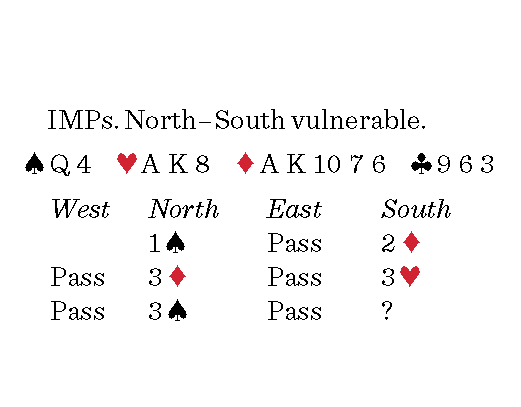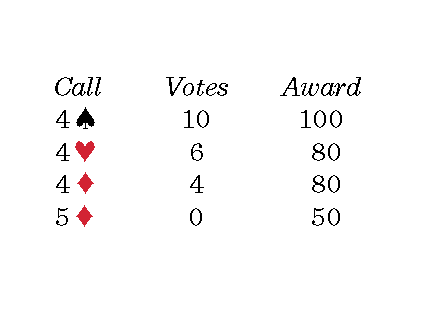
What’s your call?
| 3NT | ||||
| 4♣ | 4♦ | 4♥ | 4♠ | 4NT |
| 5♣ | 5♦ | 5♥ | 5♠ | 5NT |
| 6♣ | 6♦ | 6♥ | 6♠ | 6NT |
| 7♣ | 7♦ | 7♥ | 7♠ | 7NT |
| Dbl | Pass |
4♠ by Cohen. “My motto has always been ‘game before slam.’ 4♠ is where we belong opposite, say:
♠ A K J 10 x ♥x x ♦Q J x ♣J x x.” The Joyces concur. “4˜♠ should show honor doubleton since we didn’t bid 3˜. Now partner can decide where to place the contract.”
“I realize I haven’t done this hand justice,” Rigal says, bidding 4♠, “but I have shown my hand type, give or take a subsidiary heart honor. I can’t bid 4♣ over 3♠, and going past 4♠ seems excessive.”
Falk figures 4♠ is foolproof. “Even if partner thinks I’m cuebidding a spade control, there’s not much worry — after all, I’m looking at the ♦A K and the ♥A K, so he can hardly go crazy. Mean-while, 4˜ may be our best spot, so if he wants to pass, that will almost surely be right.”
Stack reads partner’s 3♠ call as indicating a good five-card suit. “So we can raise with the excellent two-card support. If partner is cuebidding for diamonds and follows up with 5♣, then we have the values to bid a slam in diamonds.”
Lawrence bids 4♠. “We might miss a slam, but there is no certainty we are safe at the five level. This is not a good hand for standard bidding because, to this point, neither of us has limited our values. 4♥ shows the value of the hand, but partner will think I am interested only in diamonds. He won’t know I have ˜Q x.”
4♠ by Walker. “You can’t safely bid 4♥, as partner will take that as natural in an auction where you haven’t agreed on a major or notrump. That’s how I’d bid with six diamonds and five hearts.”
Nevertheless, six experts bid 4♥. Hampson is one. “I suspect a club problem in 3NT, so I will try to allow part-ner to bid and make 4♠ while leaving room for slam if he has club control.”
Sanborn, too. “My 3♥ could have been a notrump probe. I need to cuebid again to show the slammish nature of my hand. I will pass if partner tries 4♠. Other slam moves will have to be made by partner with a club control.”
Colchamiro control bids 4♥. “At IMPs, with 6–5 in diamonds and hearts, I would prefer the safety of the nine- or 10-card diamond fit and not try for a 5–3 heart fit, and partner should know that. Therefore, 4♥ is a control bid for diamonds or even spades. Either way I’m OK and 4♥ focuses partner on the problem of two fast club losers.”
Weinstein cues 4♥ — “the slam try most likely to result in partner bidding Blackwood,” then pauses to consider what 4♥ might sound like from the other side of the table. “I hope partner doesn’t pass.”
Robinson bids 4♥ to learn if the partnership has a club control. “I don’t think we do. If partner bids 5♦, I’ll pass. Over 5♣, I’ll bid 6♦. I hope part-ner doesn’t think I have six diamonds and five hearts.”
That’s exactly what worries the Gordons. “We were about to bid 4♥, but it sounds too natural and we fear an accident.” They bid 4♦, ready to pass 4♠ or 5♦.
Meckstroth treads water with 4♦. “I want to get to slam, but without a control in clubs, I need pard to take over.”
Kennedy moves forward with 4♦. “If partner’s 3♠ bid shows extra values, I am willing to explore for slam in diamonds. The bidding does not sound as though we should be in 3NT.”
The Coopers bid 4♦. “Partner wouldn’t necessarily splinter with club shortness at his second turn. We have enough HCP to play 5♦, and 4♦ is the most flexible bid. It shows real diamonds without enough in clubs to bid RKCB. If partner bids 4♥, we’ll bid 4♠ to show our secondary support. If he bids 4♠, we’ll pass. If he bids 5♣, we’ll bid 6♦.”

